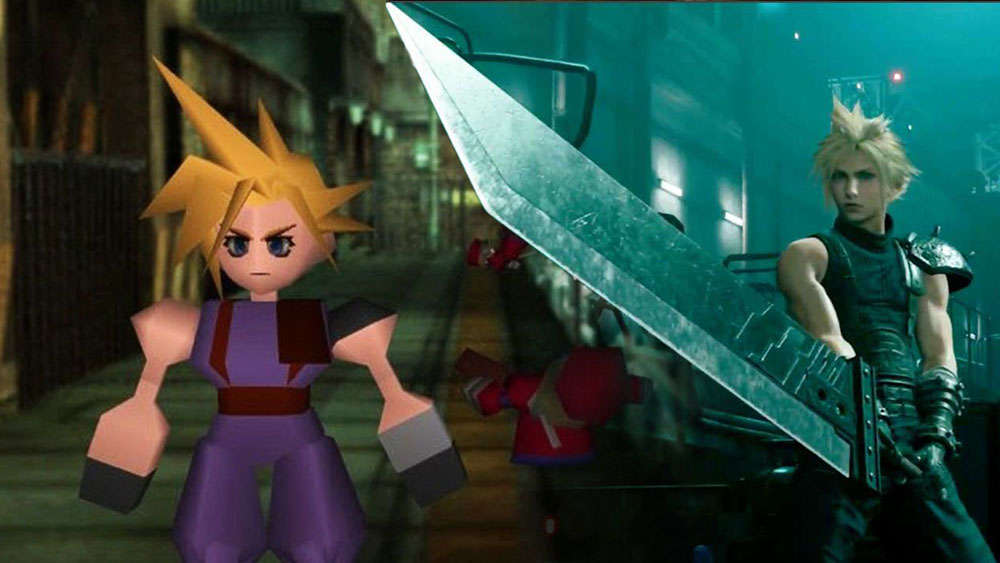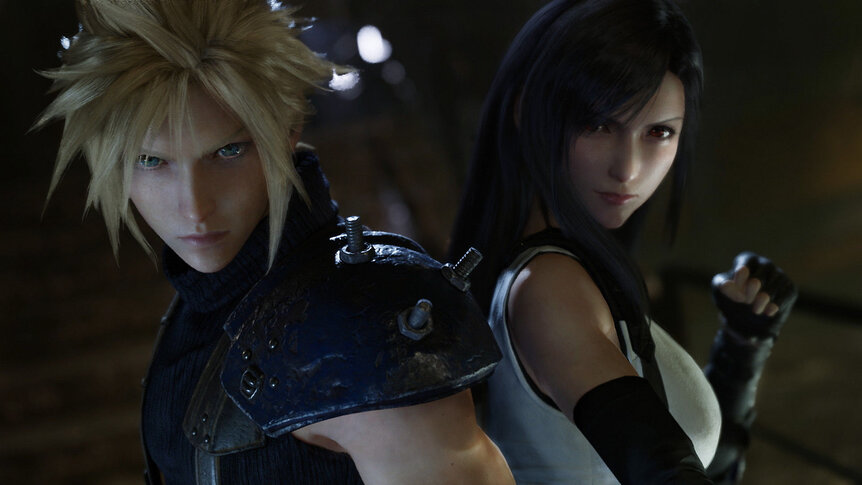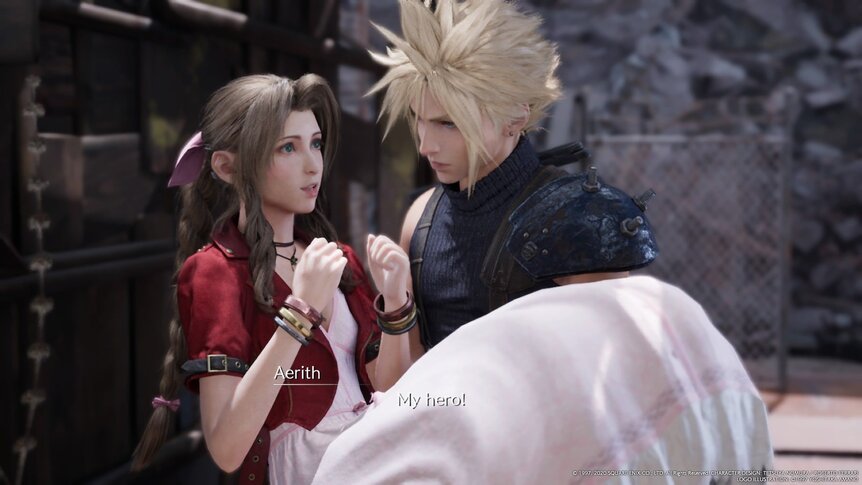Create a free profile to get unlimited access to exclusive videos, sweepstakes, and more!
Remake or reboot? What, exactly, should we call Final Fantasy VII Remake, and others like it?

Square Enix's Final Fantasy VII Remake is caught between two worlds. While it was being developed, everyone largely assumed it was just going to end up a standard, modernized update of the original game, albeit split into multiple parts released over several years. But, when the first installment came out for the PlayStation 4 in April, it turned out that "remake" was perhaps the wrong word to describe it.
Now, gaming experts and rookies alike are wrestling with what it and the future games in the franchise — and beyond — actually deserve to be called.
This post contains major spoilers for both the original Final Fantasy VII and Final Fantasy VII Remake.
When it comes to games, the distinction between a remake and a remaster can be hard to spot at first glance. A remastered game has improved graphics and whatever quality of life improvements and extra content came after the game's original release. Though a remake can have those improvements and extra content, it may also have something extra, from improved graphics and gameplay mechanics to an updated story.
It seems clear, but there have been a lot of remasters in this current generation, with even more on the way for older games like SpongeBob SquarePants: Battle For Bikini Bottom, Destroy All Humans, and the original Crysis. The word "remaster" has now become something of an umbrella term for modern versions of games that released a console generation or more prior, and that can set strange expectations for fans of those beloved games.
Final Fantasy VII Remake was released a week after Capcom's own remake of Resident Evil 3. Like last year's Resident Evil 2, this remake makes significant changes to the original 1999 version, getting rid of the tank-like controls and fixed camera in favor of over-the-shoulder aiming and a sprawling city to explore. It's a noted departure from its source material, and to Wushu Studios' Nate Najda, it's specific changes like those that make a game a remake. "Remasters keep a vast majority of the original code intact," he tells SYFY WIRE. "They play exactly the same... but remakes will change everything, from camera and mechanics to brand new narrative sequences. In that sense, you're practically playing an all-new game."
In addition to handling community for Wushu, Najda also writes for The Escapist, hosting a weekly video series called The Joy of Gaming. He has not played the original Final Fantasy VII, which is now available on all current gaming systems — and he says he doesn't plan to. The remake is, for him, good enough and modern enough that it's his definitive version of the much-lauded title.
"All I knew about Final Fantasy VII going in was basically 'Cloud, Barret, and Tifa are good; Sephiroth is bad!'" he says. "Seeing all the characters react and emote was refreshing."
But, while Najda and other Final Fantasy VII newcomers can't wait to experience the rest of the iconic story for the first time, many fans of the original game have qualms, because it's not the same story.
As Remake's narrative continues, it becomes increasingly clear to those familiar with it that everything is off, most notably signified by the game's protagonist Cloud Strife suffering frequent headaches and seeing visions of the game's chief antagonist Sephiroth. Mysterious ghosts called Whispers keep popping in and out of the plot at random, most notably around the cheery magician Aerith Gainsborough.
Toward the game's end, the reason why everything feels so strange is revealed: FF7 Remake isn't a straight remake like its name would imply, but more like a sequel or "What if?" to the original game.
In defeating the Whispers of Fate and their Arbiter, Cloud and his friends create an alternate timeline. The after-effects of this are immediate thanks to the appearance of Zack Fair, Cloud's friend and star of the beloved PSP prequel Crisis Core. In the original game, he was Cloud's role model and Aerith's former flame before he was killed by a Shinra hit squad prior to the start of the story. In this new timeline, he now survives the attempt on his life, and he and Cloud make the trek to Midgar to become mercenaries. As Zack and Cloud arrive in Midgar, it's clear that more changes are in store; the game even calls itself an "unknown journey" before the credits roll. It's a meta way of telling diehard fans that they need to prepare for even more changes. Yes, it turns out Final Fantasy VII Remake is and will continue to be a self-aware adventure about its own existence, from the original game to expanded media like the Advent Children movie.
For fans who just wanted to play the original game as is, but prettier, this felt like a betrayal. Remake isn't just adding narrative content, but changing canon to various degrees yet to be fully seen. Only time will tell how — if at all — these changes affect the series' overall narrative. But perhaps this narrative choice was to be expected — as io9 and Wired writer Julie Muncy notes, this is perfect territory for Square Enix. She finds that being an ersatz sequel "isn't shocking territory to tread, given the publisher also makes the increasingly meta and convoluted Kingdom Hearts franchise, whose most recent entry last year features a title card poking fun at the series' silly naming conventions. The real difference comes in how frank the game presents these differences. "I don't think it's what anyone expected to happen with Remake to happen in such a bold, obvious way," she tells SYFY WIRE.
The game's conclusion also serves as a statement in and of itself. "The ending says that from here on out, this story goes where the developers now want to take it," Muncy says, noting that the next installments won't be constrained by the original game's narrative. Muncy compares Remake to Hideako Tanno's Rebuild of Evangelion series, which retold the story of the classic anime, but with the awareness that events have happened before.
FF7 left a mark on both for the franchise and JRPGs in general, its success having catapulted the RPG genre to consoles outside of Japan. It has a special place in the hearts of those who played it, and as such, it only makes sense for Remake to actually be about its own legacy. "Remake is special specifically because of [the original's] sacred status," Najda says, arguing that it may be the only game that earned the right to be so meta about its own impact on gaming history. "There's a ton of room for Square's current designers to play around in."
Kotaku's Heather Alexandra wrote that this was something of a foregone conclusion, because "you can't make Final Fantasy VII in 2020. You can only make a game about trying to make Final Fantasy VII in 2020." Alexandra further notes even Remake's characters have their own agency and self-awareness in the face of a 23-year legacy.
This applies to all the characters, but none more so than Aerith. Known best for her death at the hands of Sephiroth in the original game, she's voiced in Remake by newcomer Briana White. "I listened to previous voice actors for Aerith, but I also knew I couldn't mimic them," White admits. "So I made an effort to bring an element of myself to her voice." In addition, she and Square talked constantly about who her character was from scene to scene. Since every character evolves over the 30 or more hours, it had to be that way. And, in her words, "that's what makes any story worth telling."
Just as Aerith fans have no doubt been hit with nostalgia, so too has White. She's been streaming herself playing through Remake, and she's found it a strange and beautiful experience. She didn't receive the whole script while recording, so she's still been delighted and surprised by some interactions and scenes. "I can remember the work did as the lines play out in the game… I can remember the lines where I had to fight through a sore throat." It's certainly been surreal to play a digital version of herself. "Every time someone says Aerith's name in the game, I get this huge smile on my face."
Though she didn't play the original FF7, White knew of her character's fate beforehand. Unsurprisingly, everything was kept secret while recording, and learning about the differences between the two games came piece by piece. "During recording was when we started to discuss differences from the original game, mostly in regards to deepening character stories or in adding new characters," White explains. The secrecy was difficult to keep, but she feels it helped everyone in the cast give the best performance possible. She even found some excitement in recording scenes that were exclusive to the new game.
Despite becoming one of the fastest-selling PS4 games, Remake's status as, well, a remake, will now constantly be called into question for later installments. Could the changes to the story and characters have gone over better if Square were more upfront about the deviations? Should a game that is just a straight remake like Resident Evil 3 or the allegedly in-development remake of Resident Evil 4 have a subtitle, much like how some remasters like Red Faction Guerrilla: ReMarstered use wordplay to make their distinction clear? Muncy finds it unnecessary, though she does admit the issue still remains. "It's not quite a sequel, not quite a sequel...more a Redo, but one made with full awareness of the previous work and in dialogue with it." That would be hard to put on a box.
It will no doubt be years before we get our hands on the second Final Fantasy VII Remake game. Who knows, maybe Square Enix will throw a curveball and call it something different or remove the "Remake" title entirely. But the conversation will no doubt continue, likely giving the remake a legacy of its own.
















